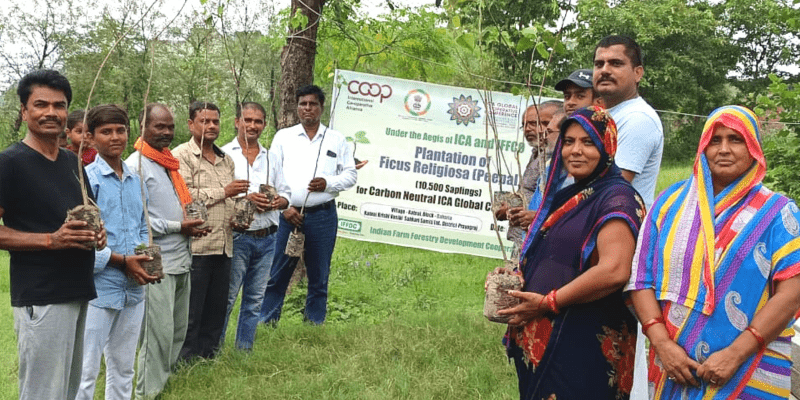
In September, we shared how the Indian Farm Forestry Development Cooperative (IFFDC) – a subsidiary of the conference hosts IFFCO – is planting thousands of peepal trees to offset emissions generated by the Global Cooperative Conference and make this the greenest ICA event yet. This project is well underway, with over 10,000 saplings planted over the last few months.
The peepal (Ficus religiosa) or sacred fig is a species native to the Indian subcontinent and Indochina that belongs to the fig or mulberry family and is considered sacred by the followers of Hinduism, Jainism, Sikhism and Buddhism. They live up to 100 years, growing 30 metres tall and with a trunk diameter of up to 3 metres. They are also known for their ability to absorb carbon dioxide.
IFFDC has planted saplings in Odisha (2,511), West Bengal (2,700) and Uttar Pradesh (5,500), on community land, along roadsides, on school and temple grounds and around IFFCO plants.
Established in 1993, IFFDC aims to conserve the environment and mitigate climate change through sustainable natural resource management and collective action, while boosting the socioeconomic status of rural poor, tribal communities and women in particular.
To reach every corner of the country, 152 village-level Primary Farm Forestry Cooperative Societies (PFFCS) were established with 19,331 members. To date, nearly 30,000 hectares of waste and arid land have been developed as multi-purpose forests and IFFDC is currently implementing 29 projects addressing livelihood development, agriculture, horticulture, natural resource management and women's empowerment in nearly 10,000 villages across nine states.
It has developed 8,515 wadis (small orchards) and is nurturing 1,715 self-help groups with 18,229 members, 95% of whom are women.




